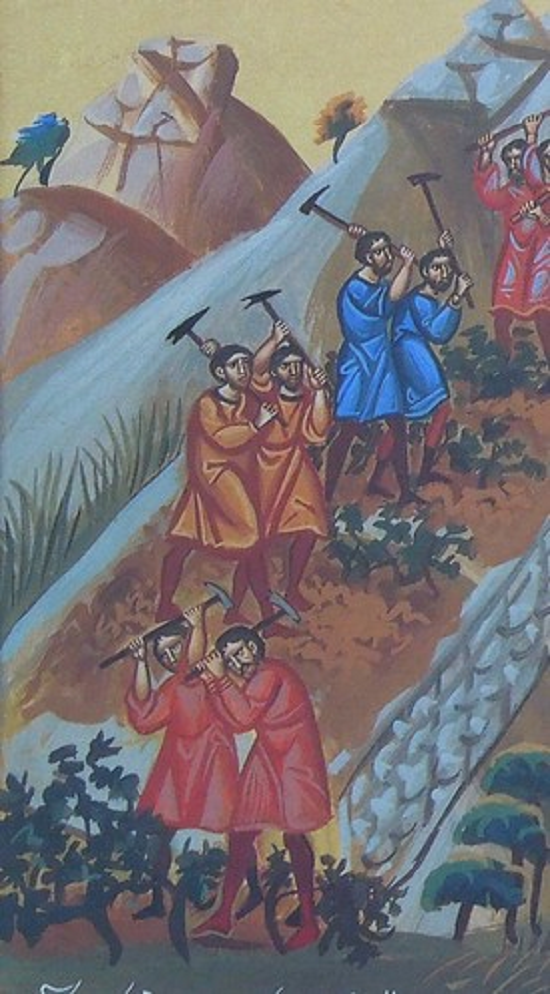The Vineyard of the Soul
Twenty-Seventh Sunday Scripture Readings

Today’s gospel reading presents us with a different kind of parable. Ordinarily, I’ve encouraged you to think of Jesus’s parables more in terms of a Zen koan—a short, pithy narrative that’s meant to be pondered and absorbed rather than analyzed. In many cases, Jesus’s parables were transformed into allegories by later reflections on the experience of the early Christian Church. However, today’s parable is almost certainly a deliberate allegory from the mouth of Jesus himself. To begin with, Jesus references the Prophet Isaiah in the passage we read today as our first reading. Even in the hands of Isaiah, the figure is allegorical. He states that the “friend” who planted the vineyard is Yahweh, and the vineyard itself is Israel. He says,
“The vineyard of Yahweh-Sabaoth is the house of Israel,
and the people of Judah are his cherished plant;
he looked for judgment, but see, bloodshed!
for justice, but hark, the outcry!”
When Jesus told his parable to the chief priests and elders of the people, it’s impossible that they wouldn’t have immediately thought of this passage and understood that Jesus was speaking allegorically about Israel and about them. Who was it, after all, who were left in charge of God’s people? It was they, themselves. There can be no question but that Jesus was talking about them when he referred to the tenants who were left in charge of God’s vineyard. Whereas Isaiah pointed out the infidelity of the whole people of Israel and Judah and pictured the devastation to come on the nation as a whole, Jesus focused his warning on them—the religious and political leaders.
In this parable, the servants sent to collect the proceeds from the harvest represent the prophets sent over and over again to recall the leaders of the people to fidelity. But they, in turn, abused and killed the prophets because they dared to criticize their teachings and behavior. Then, Jesus speaks of the owner of the vineyard sending his son as a last resort. This is one of the very rare times in the gospels where Jesus hints at his identity and his mission: the Son of God sent to call the people of Israel back to fidelity. The leaders of the people, meanwhile, were expecting a messianic king who would restore the independence and fortunes of the nation. Instead, Jesus suggests to them that, in fact, the Messiah to be sent would be the Son of God—someone with a unique relationship with the divine Landowner. For the rulers of Israel, this was something both unexpected and confusing. What would it mean to them and to Israel for God to send his Son?
Furthermore, the parable spells out the fate of the Son—a fate that was a logical extension of how the leaders of Israel had always dealt with the prophets who had criticized and threatened their power and authority. Killing the long-awaited Messiah was, for them, unthinkable. In the parable, the tenants—representing the very chief priests and elders who were present and listening to Jesus—were pictured as trying to wrest the vineyard of Israel out of the hands of God himself. Jesus was all but accusing them outright of not only rebelling against God but of seeking to replace the will of God with their own wills. This prediction of the fate of the Son of God at the hands of the Jewish authorities was not an exercise in paranoia on the part of Jesus. Again and again, the gospels tell us that the chief priests and elders sought opportunities to kill Jesus. It was no secret. Everybody knew it. Jesus simply confronted them with it.
That was then, this is now. It’s never enough just to understand the background and meaning of our gospel passages. We have to ask, of all the thousands of hours of preaching and teaching that Jesus did publicly among the crowds and privately with his disciples, why was this parable included in the gospels? Was it merely to give us the background to the religious and political climate that led ultimately to Jesus’s arrest and execution, or is there more? Once again, we need to be reminded that the gospels themselves are prophetic writings. That means that the events they describe had a certain meaning when they happened, a deeper meaning when they were reflected upon and written down, and a still deeper meaning today when they’re read. The very nature of prophetic writings is that they are eternally open to new and deeper interpretations and understandings. The gospels are never simply about Jesus and his words and deeds, nor are they only about the Christian Church and their experience and reflections upon Jesus’s life, death, and resurrection and its mission in the world, but they are about us—you and me. How are we implicated in today’s gospel?
The vineyard of the gospel could be understood as representing your own life, and mine. We start our life’s journey, not on our own power, but as gift—each of us is a new creation full of potential and possibility, like a newly planted, fertile vineyard. We’re given the keys to this little kingdom and soon we understand that something is expected of us. Somehow, in some way, we have a responsibility to make something of the gifts we’ve been given or, better yet, the potential that we’ve been gifted with. Even from our earliest years, we recognize a triple responsibility: the responsibility we have to nurture ourselves and to grow into authentic human beings, the responsibility we have to bear fruit and contribute something positive to the human community that we’ve been born into, and the responsibility to foster a relationship of recognition and gratitude to the divine Landowner who put us here.
The temptations we face as human beings are many and powerful. Our greatest temptation is the insane belief that it is we who are all-powerful, that we are in control, that we don’t need anybody or anything, that we are arbiters of good and evil, of right and wrong, and that we can do it “my way” without responsibility and without consequences. In other words, our human temptation—like that of the tenants in the vineyard—is to rebel and take the place of God. Every human temptation is the temptation to replace God with ourselves. It’s like saying, “My will, not thine be done.”
Like in the parable, God continually sends his prophets and servants to us to teach and correct. There’s only one lesson to learn in this lifetime, and that is to love. When we fail love’s lesson, God is patient. The lesson comes back again and again, and with interest—each time, a bit more insistently. God’s prophets—his messengers, his angels—come in the form of flashes of intuition. Whether it’s an uncomfortable feeling in a situation, or an unusual thought that seems to be coming from outside ourselves, or a strange coincidence that grabs our attention, God continually sends his servants to receive the proceeds from our labors of love. Often, when things turn out badly, we think back and realize that we’ve missed or ignored the cues that would have guided us to better choices. We may then realize that we’ve turned a deaf ear to a prophet.
We here today want to be faithful tenants in God’s vineyard. How can we learn to become more sensitive to the voices of the servants God is constantly sending us? We must learn to listen, and that lesson is never finished. Like riding a bicycle uphill, we’re either striving to become more spiritually sensitive or we’re sliding backward into spiritual numbness. What do we need to do to grow? The only practices that will grow our sensitivity to the will of the Landowner are prayer and meditation. We mustn’t wait until the end of life to look back and say, “I wish I’d learned to be more sensitive and responsive. I wish I’d learned to make something more out of my life.” Yet, for some reason, people are hesitant to undertake the work of the vineyard: prayer and meditation. “I don’t know how,” they say. “It’s too hard.” In fact, the spiritual practices of prayer and meditation are easy. The hard part is actually sitting down and deciding to do it. Nobody knows how to do it until they do it.
I can’t tell you what will work for you, but here’s how I do it: I set my alarm to go off at 4:30 every morning. It’s dark. There are no distractions. I hate getting up. I want to turn back over, but I just don’t. Then, before I do anything else, I go to my quiet place and spend half an hour or so quietly listening…to what? I don’t know. I don’t usually “hear” anything. Nothing “happens.” I’ve learned over time that God speaks heart-to-heart. God doesn’t need my thoughts to teach me. By the time I get up to start my day, I’m centered, I’m focused, my sensitivity is high, and yet my heart is quiet and peaceful. From then on, I have the capacity to handle the obstacles, failures, and frustrations that will inevitably come, but without the drama. And, at the end of the day, I’m happy to return to God with overwhelming gratitude the fruits of this life—this vineyard—with which he has blessed me.
“Blessed are you, Lord, God of all creation. Through your goodness, we have this wine to offer, fruit of the vine and work of human hands. It will become for us our spiritual drink.”
Get articles from H. Les Brown delivered to your email inbox.
